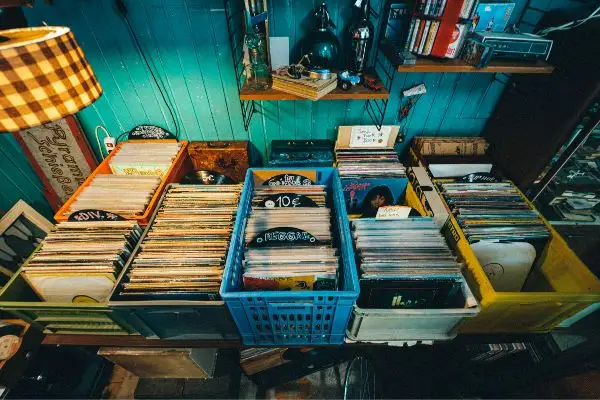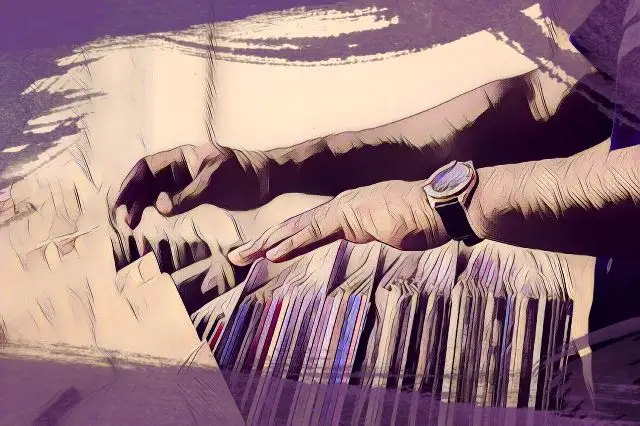Navigating your first public project can be challenging. If you're gearing up to release music, you're likely overwhelmed by industry jargon, acronyms, and all of the mechanics that come with distributing a professional project.
Not to worry! Below, we'll delve into the key difference between an EP vs LP so that you can secure the right format for your release.
EP vs. LP In The Music Industry At A Glance
To get to the heart of the matter, an EP is a collection of typically four to six tracks while an LP or album is a body of work that contains seven or more tracks. These amounts were originally determined by the amount of music that could be held on vinyl records as discussed below, but the legacy of the track limits still holds today.
EPs and LPs aren't the only music industry-standard formats, though they are arguably the most common for artists releasing projects. Streaming platforms might have changed the way we release music, but an extended play record and full-length album have a long recorded history within the music business.
For reference, EP stands for extended play while LP stands for long play. You could even consider an EP album a mini album by principle - these projects are too long to be considered singles, but too short to warrant the title of album.
The History Behind Vinyl Records: What Created EPs vs LPs?
EPs and LPs are distinguished by the length of music and the number of tracks. These two factors came into play during the creation of vinyl records. Originally, Columbia records created a vinyl record that could hold up to 23 minutes of audio on each side. This was a huge advancement since at the time, the standard was a 12-inch record that could only play 5 minutes of audio on each side. Hence, the creation of full-length albums.
In order to compete with this format, RCA records released a smaller vinyl record that could hold approximately 8 minutes of audio on each side. These smaller records paved the way for the typical EP, serving as album samplers or just smaller projects for musicians.
Understanding The Different Formats: LP, EP, and Singles

To start, it's key to break down the different possible formats for music releases. When you're releasing music, you're distributing your art as a single, EP, mixtape, LP or full-length album, or double LP.
LP
An LP or full album holds anywhere from 7 to 29 tracks of physical or digital music. This is also the name of a modern studio album. An LP album is typically between 35 and 60 minutes long.
Double LPs
Double LPs are the most long-playing vinyl record, with track limits above 29 tracks. These album formats came about with the dawn of retrospective albums, like an artist's "Greatest Hits" record.
The double LP records come with two double-sided records that could encompass multiple or a single album era. Double LPs might also include bonus tracks or extended versions of songs that your top music fans may enjoy.
EP
EP albums tend to hold 4 to 6 tracks. The EP album format is usually 15 to 20 minutes long and serves as a great way for up-and-coming artists to build their music careers before they're ready for album releases.
Singles
A single release is typically one track released on its own, but it can technically be up to three tracks, bridging the gap between EP releases.
Mixtapes
Mixtapes operate in a category of their own. This distribution format has few rules and originates from the hip-hop community, though it's used all throughout the music industry. Typically, mixtapes are compilations of multiple songs that don't have as much marketing or cohesion as typical formal EP or album releases.
Building Your Project Rollout
Ready to start releasing music? It's a good idea to put together a release plan for your project. Here are several methods for putting together your project release:
Waterfall Release
In the age of streaming platforms, the waterfall release seems to be the most common. In this method, artists will drop the first track of an album or EP, then followed by the release of another track and the first track. This process continues until the release of the entire project, usually unveiling a handful of new music along with the previously expressed work.
The benefit of the waterfall release is that having a more continuous project on streaming can help boost listening since the platform will auto-play to the next song.
Two Singles and An EP or LP
Many artists opt to drop two to three singles, followed by an EP or LP. This way, your listener gets a taste of what's to come, and you can build anticipation to your album with some extra runway.
The Project Drop
Legacy artists like Beyonce can drop a project seemingly without planning and still reach the top of the charts. This rollout is more or less reserved for superstar artists who have built up their community to a point where it can run itself.
Releasing Singles
If you have a track that didn't quite fit your previous albums or find yourself in between releases, it may make sense to drop a single entirely on its own. Artists might also drop singles as an extended single as bonus tracks to the album that was recently released.
Should I Release An Album Or An EP?

The best release schedule is entirely dependent on your goals as an artist. Are you looking for new listeners? Single might be the best way to quickly introduce new sounds into your catalog. Looking to provide some depth for fans? Opt for an album or LP. Somewhere in the middle? An EP makes sense for artists who want to start building beyond single releases.
It's also worth mentioning that a debut album or entire release comes with its own connotations. Some artists may prefer to wait until they progress along their music career before dropping their first studio album. Other artists might not find this aspect as important.
In any event, don't let your fears around the project format prevent you from releasing new music. In the age of digital downloads and streaming platforms, your most popular songs may hit peak popularity years after they've been released.
Finding the right way to roll out more songs can be confusing. At the end of the day, listen to your fan base when choosing between launching a single, EP, or album. Committing to consistently releasing music will help keep your fans engaged while you build your skillset along the way. Have fun sending your art out into the world!





